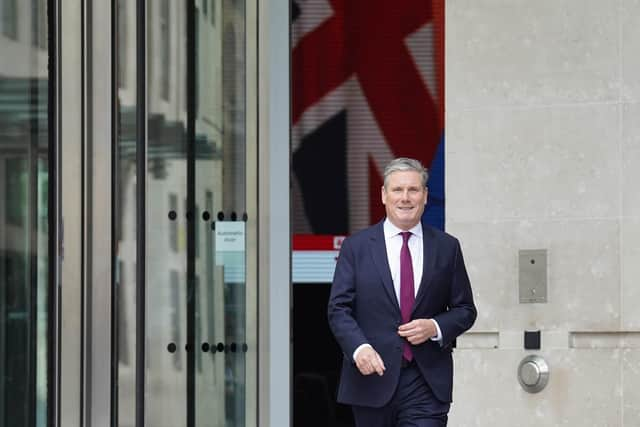Labour should pledge to abolish two child cap on Universal Credit if it wants to tackle poverty - Hannah Davies
Which is why when Keir Starmer confirmed at the weekend that the Labour Party would not be abolishing the two child cap on Universal Credit, put in place by the Conservative Government a decade ago, so many people working with children were dismayed.
Child poverty is at a crisis point in the North of England. From a place in around 2010, where child poverty was almost equal across the country, to today where children being born in the North of England can expect to live a year less than the English average and where an extra 144 babies die in the North compared to those in the best performing parts of the country. Child poverty is a shameful part of British society.
Advertisement
Hide AdAdvertisement
Hide AdIt is decisions made by governments that have led us to this situation.


Austerity cuts made by the Conservative-Liberal Democrat government from 2010 onwards cut harder and deeper in the North of England. Families that were teetering on the edge fell over as the burden of welfare reforms fell harder on the poorer, more disadvantaged areas – many of which were in the North of England
In Yorkshire and the Humber child poverty is now the highest it has been since 2000/2001. In Bradford West, Bradford East, Leeds East, Sheffield Brightside and Hillsborough and in Leeds Central relative child poverty after housing costs is at a colossal 45 per cent or higher.
What this means is lifelong damage to children. Children whose parents can’t afford to feed them and themselves, who choose between a warm home and a warm meal.
Advertisement
Hide AdAdvertisement
Hide AdOur Child Poverty and the Cost of Living Crisis report earlier this year heard from children who said things like “My friend didn’t have enough and I had lots of packed lunch so I bought him his lunch that day” and “It's freezing outside now and I want to feel warm, I need a hot meal”.
We heard about parents using watered-down evaporated milk in their babies’ bottles because they can’t afford formula, children turning up to school without shoes and families who would just turn on their freezer for an hour a day to try and save money.
Children are suffering a range of conditions and even dying from being brought up in mould-infested homes, even before the current cost of living crisis, one million households in the North were fuel poor. The pandemic has damaged children’s lives, the cost of living crisis has made this situation worse. But there are things that can be done.
From highs in the late 1990s, relative child poverty rates declined in the North of England in the 2000s, by the time of the financial crisis in 2008 the percentage of children living in poverty was close to the UK and England average.
Advertisement
Hide AdAdvertisement
Hide AdThe two-child limit to the child element of universal credit has been shown, in recent research, to be the leading driver of child poverty across the UK. Getting rid of it would lift 250,000 children out of poverty and see 850,000 in less deep poverty.
The Child Poverty Action group last week showed lone parents with three children can be left with as little as £44 a week to live on after housing costs.
The last Labour government was bold in its ambitions on tackling child poverty. In 1999 while Prime Minister, Tony Blair said in a speech at Toynbee Hall he wanted to make a 20 year commitment “for ours to be the first generation to end child poverty”.
For the children growing up in the North of England we need to see similar boldness and dedication to the future. Abolishing child poverty is an admirable and, importantly, a realistic aim and getting rid of the two child cap is a significant and relatively inexpensive first step.
Advertisement
Hide AdAdvertisement
Hide AdThis is why it is frustrating that the Labour Party, who say in their Stronger Together policies that “The Conservative approach to social security is especially failing children, who are too often the victims of cuts to welfare support”, has not committed to getting rid of the cap.
Labour should be looking forward to bold new policy ideas for a bold new society if they are to win the next election – and that new society starts with our children.
When Marcus Rashford highlighted the many thousands of children going hungry during the pandemic, society rallied. We don’t want to see children malnourished and freezing, in 21st century Britain children should be born with opportunity – not see their opportunities stunted from their earliest years. Keir Starmer’s Labour Party has the opportunity, if they win the next election, to make huge waves in tackling child poverty. To do so, getting rid of the two child cap on universal credit is a vital first step.
Hannah Davies is director of Health Equity North.